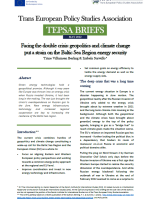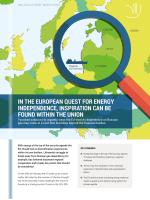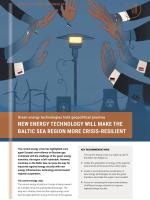Facing the double crisis: geopolitics and climate change put a strain on the Baltic Sea Region energy security
The long-standing discrepancy between eastern and western perceptions of energy security are converging after the Ukraine war. Where the East traditionally focused more on the geopolitical side of energy supply, and the West on the economic dimension of the sustainable energy transition, the two parts of the Baltic Sea Region are now forced to look at the energy agenda in the same way: as a crisis consisting of both geopolitics and climate change.
To date, regional political cooperation has not been formalized to address both challenges within a common framework. The solution, therefore, lies in creating a common forum for addressing energy issues while at the same time investing heavily – and together – in green technologies write Trine Villumsen Berling & Izabela Surwillo in this policy brief from TEPSA. The brief is an output from the project SECURITECH funded by the Carlsberg Foundation.
DIIS Eksperter








